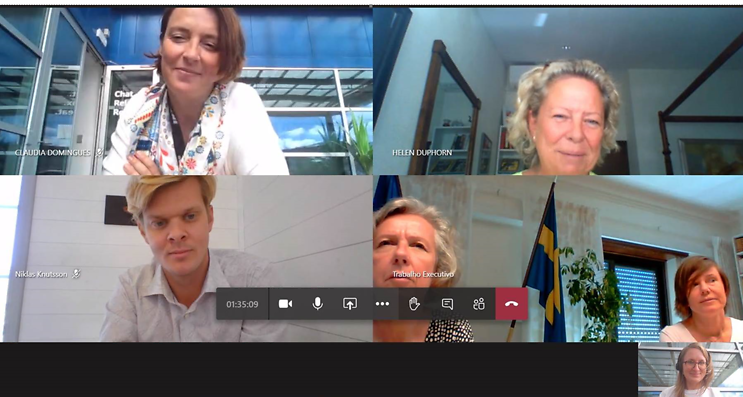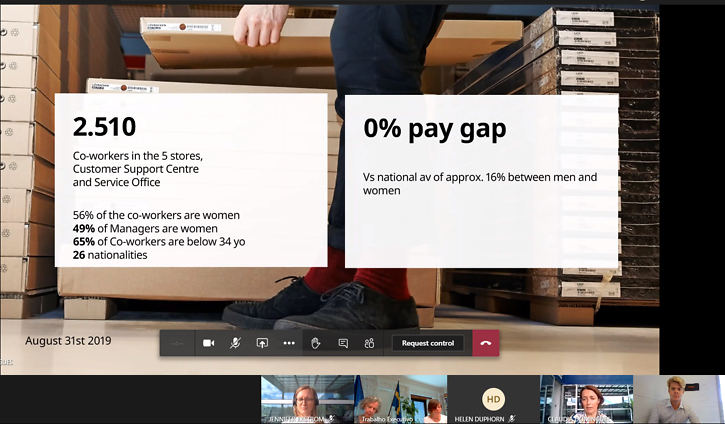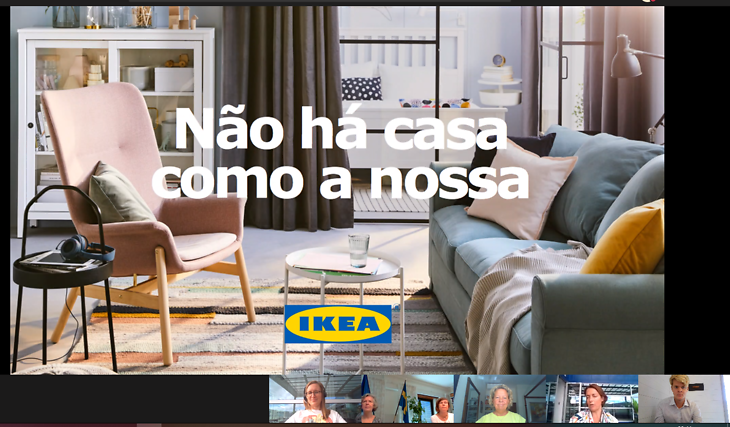On Wednesday July 1st, Team Sweden had a virtual meeting with Country Retail Manager, Helen Duphorn and Country Communication Manager, Claudia Domingues at IKEA Portugal to learn more about its operations. The company has been in the limelight in recent times, not least due to their decision to pay back the state-aid support received during the initial lockdown this spring.
We learned about how IKEA adapted their business to continue operations during the pandemic, and we also got a deeper insight on how their values enable the company to create a better life for the many, where everybody can have access to a beautiful home.
When IKEA opened the first store in Portugal (Alfragide, Lisbon) in 2004 it was love at first sight between the company and the Portuguese. In just over 15 years, IKEA has grown to become an integrated part of the Portuguese home, and many in Portugal travel frequently to eat in the IKEA restaurant, or to pick up groceries in the "Swedish Food Market". In this time, IKEA Portugal now operate 5 stores from the Loule to Porto, 2 shopping centers (Marshopping in Matosinhos and Loulé) and offers 12 collection points inland to support the e-commerce.
This rapid expansion has led to that IKEA today employs more than 2500 people in Portugal and they are constantly hiring more coworkers. In addition to this, the sister company IKEA Industry employs 1500 people in their furniture production center in the North of Portugal (Paços de Ferreira). IKEA has become not only a part of the Portuguese home but a workplace for many Portuguese.

IKEA Portugal can proudly share they have gender equality in its store operations, where women make up both about half of the employees and half of the management positions. IKEA Portugal has also managed to eradicate the pay gap between men and women, meaning there are no disparities between men and women within the company. The fact that they have achieved this is commendable, as the national pay gap still sits at between 16-22%.
For IKEA, it is natural to offer an environment where every employee feels empowered and accepted regardless of gender, ethnicity, sexuality, or other. One way that IKEA cares about the employees is to always strive to provide better conditions than they are legally set. Another way of empowering employees is to care about achieving diversity in management positions. Through future recruitments, IKEA Portugal aims to achieve a management composition that mirrors the Portuguese society at large.

IKEA wants to create a better life for the many. A beautiful home should be within reach for all, including those who do not have a lot of money to spend. At the same time, they want to be a part of the solution to climate change and aim to become climate positive by 2030. To combine these two visions, IKEA organizes their operations according to three strategic focuses that secure the well-being of the business, people and the planet:
Affordability centers around about being able to offer beautiful things at an affordable price. In Portugal, where the median family has about €50 to spare after expenses are paid, securing price and quality becomes essential. To assist families, IKEA showrooms in Portugal showcase bedrooms from €300 and living rooms for €500. With the current low-interest rates, IKEA is also able to provide no-interest loans to customers to finance their dream home.
Accessibility means making IKEA products available throughout the country, On the mainland, there are 5 stores and a total of 12 collection points for customers to pick up online orders. IKEA has in June opened a new collection point at Madeira and will shortly open one in the Azores, offering fixed rates for shipment.
Sustainability is key to secure the future of the IKEA business. IKEA has the objective to become climate positive and regenerate resources while growing the IKEA business model. In Portugal, IKEA has already taken steps towards this goal. Partly by setting an objective that all their wood materials used will be recycled or from sustainability certified forests, and also by building a wind park in Portugal that generates enough electricity to supply 25 stores or 40 000 households. This makes IKEA Portugal energy independent.

With the COVID-19 pandemic, it is clear that the home has become more important than ever. The lockdown has also put restraints on the IKEA cash and carry business model. With stores closing down, and co-workers being put on layoff, IKEA has had to rethink the way in which they operate their business. The result has been impressive.
During the months of lockdown, IKEA managed to turn up its e-commerce and transformed its stores into packing centers for online purchases. By being able to maintain packing operations as well as the safety of the coworkers, IKEA could maintain their collection centers open and operate via them. In this way, the e-commerce increased as IKEA continued to operate digitally. When government restrictions linked to the pandemic began to ease, and IKEA could better understand the impact of the business, IKEA Portugal, in global alignment with the INGKA group (which IKEA Portugal is part of), made a decision to pay back the state-aid support provided during the crisis.
These times have shown that the IKEA business model is resilient and that they have the agility to reorganize their organisation faster than they could have imagined. It was shown that by focusing on their three strategic objectives of affordability, accessibility and sustainability, IKEA can thrive and will endure even in times that become ever more uncertain.
From Team Sweden Portugal, we are happy to have been following this dynamic journey and feel proud of our member, as the Swedish rooted company's capabilities of turning crisis into an opportunity!